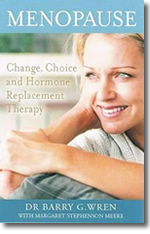Change, Choice and Hormone Replacement Therapy
by Dr Barry G. Wren and Margaret Stephenson Meere
Rockpool Publishing; Summer Hill, 2013
 Over the last 11 years, menopause has experienced its own 'dark ages' much to the detriment of women who happened to be transitioning menopause or who were post-menopausal. Easy access to basic information about menopause and rational discussion of controversial issues were lacking. "Menopause: change, choice and HRT" has filled that void as an easy to read source of information about all aspects of menopause. It has been designed to be read in part or whole so that if the reader is seeking specific topic information, all pertinent information relating to that topic can be found in the chapter dedicated to that topic. This tended to lead to some repetition of information. However, when reading the book from cover to cover, this served to refresh the memory for readers who are less knowledgeable in this field.
Over the last 11 years, menopause has experienced its own 'dark ages' much to the detriment of women who happened to be transitioning menopause or who were post-menopausal. Easy access to basic information about menopause and rational discussion of controversial issues were lacking. "Menopause: change, choice and HRT" has filled that void as an easy to read source of information about all aspects of menopause. It has been designed to be read in part or whole so that if the reader is seeking specific topic information, all pertinent information relating to that topic can be found in the chapter dedicated to that topic. This tended to lead to some repetition of information. However, when reading the book from cover to cover, this served to refresh the memory for readers who are less knowledgeable in this field.
The addition of a summary at the end of each chapter was a particularly useful inclusion which could easily substitute for reading the complete chapter if time is at a premium.
The appendices were also important for interpreting the information by nonmedical readers as was the use of simple language where possible, when presenting complex information. Grouping the references by chapter was helpful but there were many unreferenced statements that I felt could have had substantiation considering the perceived importance to the woman reader. Adverse side-effects of HRT where weight gain is discussed as body image, is very important to many women. Inclusion of real cases to illustrate experiences of menopause and the trauma poor management of symptoms imposed on an individual made the read more engaging.
I believe this book would be a useful introduction to the topic of menopause for undergraduate medical, nursing and allied health students because of the coverage of contemporary issues arising from recent research reports and their ramifications for treatment choices. The knowledge gained would enable these students to engage in conversation with patients and empower them to encourage the patient to seek informed medical advice. The book also provides a relatively unbiased source of information for women wanting to increase their knowledge about menopause so they can better discuss options of symptom management with their doctor.
I commend the authors for their dedication and effort in producing this book.
Jenny Nitz PhD, MPhty, BPhty FACP
Physiotherapist
Content updated November 2013
